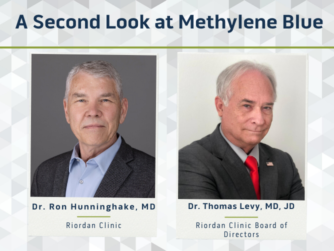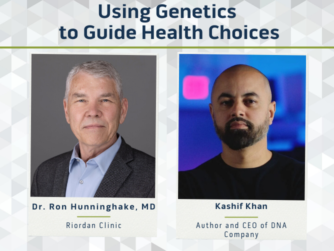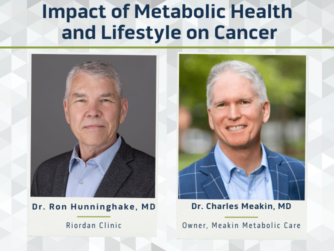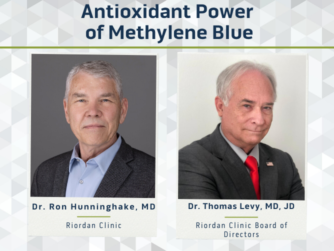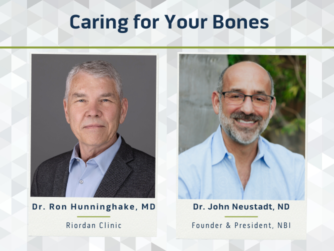Dr. Ron Hunninghake, MD, welcomes Dr. Tereza Hubkova, MD, to discuss the whole-body approach to the diagnosis and treatment of autoimmune diseases as well as some potential causes for the conditions. They also discuss how patients can use diet, lifestyle choices, and environmental changes to help ease symptoms and prevent or delay autoimmune diagnosis.
Thank You To This Episode’s Sponsor
Bio-Center Laboratory
Episode Transcript
Episode#40: Functional Approach to Autoimmune Disease with Dr. Hubkova Download
Disclaimer: The information contained on the Real Health Podcast and the resources mentioned are for educational purposes only. They are not intended as, and shall not be understood or construed as, medical or health advice. The information contained on this podcast is not a substitute for medical or health advice from a professional who is aware of the facts and circumstances of your individual situation. Information provided by hosts and guests on the Real Health Podcast or the use of any products or services mentioned does not create a practitioner patient relationship between you and any persons affiliated with this podcast.
Intro: This is the Real Health Podcast, brought to you by Riordan Clinic. Our mission is to bring you the latest information and top experts in functional and integrative medicine to help you make informed decisions on your path to real health.
Dr. Ron Hunninghake: Well, welcome everyone to the Real Health Podcast from Riordan Clinic. I’m Dr. Ron Hunninghake and it’s our good fortune today to have Dr. Tereza Hubkova who is the medical director of the Whole Health Institute at AdventHealth there in Kansas City. Dr. Hubkova, welcome to Real Health.
Dr. Tereza Hubkova: Thank you so much for having me, Dr. Ron. It’s a pleasure.
Dr. Ron Hunninghake: Dr. Hubkova and I share an interest in autoimmune disease and so I’ve invited her on this show to talk a little bit about it. And so could you kind of explain to our audience, when the words autoimmune disease come out, what are people talking about?
Dr. Tereza Hubkova: Autoimmune diseases are diseases where the immune system of our body turns against our own organs, against our own tissues, which is a problem because it then destroys those tissues. Some common examples would be autoimmune thyroid disease like Hashimoto’s thyroiditis, which attacks the thyroid and then people end up being tired, depressed, gaining weight, constipation, and all kinds of other symptoms and they may have to be on a thyroid medication as a result. Or sometimes the autoimmunity can make the thyroid overactive and that’s Graves’ disease. Other types of autoimmune diseases may affect joints and people end up having rheumatoid arthritis or lupus. Lupus also affects organs in the body. People can have problems with their heart or lungs or kidneys. So autoimmune diseases are a huge problem. They are on the rise, and it really has reached epidemic proportions.
Dr. Ron Hunninghake: So why is the immune system getting mixed up like this?
Dr. Tereza Hubkova: Yeah, that is a very good question. And it seems that it has to do something with possibly even our early childhood when the immune system is learning who is the friend and who is the foe, mostly in our gut. So when we are born, we kind of receive a lot of the microbes from our mom during vaginal birth, and the microbes that we get from our mothers immediately start communicating to the immune system. The microbes from mom teach our immune system how to recognize our own tissues, how to not fight against food and are absolutely crucial for our health going forward, even into our adulthood.
Dr. Tereza Hubkova: And ever since we changed the way that we are born, we have more and more children born by C-section, when they don’t really get exposed to the natural microbiome from their mom instead that are born in the surgical suite, in sterile conditions, and then touched by the nurses, carrying the bacteria from the hospital. Lack of breastfeeding. And then our terrible diet, which is full of sugar, salt, fat, and doesn’t really have enough nutrients that would support the healthy gut microbiome. So the immune system doesn’t learn how to distinguish well between self and an unself. It gets confused and all kinds of diseases from allergies to chronic inflammation to autoimmunity are a result of that.
Dr. Ron Hunninghake: What other things … I’m thinking in my mind, in the last 30, 40 years that I’ve been a doctor, the use of antibiotics has really grown and are there other environmental things that have happened that could be messing up the gut?
Dr. Tereza Hubkova: Yeah. Another great question. And antibiotics, as helpful as they can be, and certainly we would want you to take an antibiotic if you have pneumonia or strep throat, whenever you take an antibiotic, you have to realize that you’re dropping a bomb, not just on the bad microbes, but also on the good bacteria and you’re basically damaging the microbiome. And the microbiome gets less diverse, less resilient. And if you repeat that, the more you repeat that, the more antibiotics you take, the less effective your immune system actually will be as a result. Another big problem are medications that lower stomach acid, proton pump inhibitors. So a lot of people take them maybe because they had acid reflux, which really should be treated with diet and weight loss and other things, not with medications that lower stomach acid. But because the stomach acid is supposed to sterilize your food basically and help you digest it, now you don’t digest your food properly, now you can have overgrowth of microbes in your small intestine, and that leads to something called leaky gut, inflammation, and a lot of diseases can be a result of that.
Dr. Tereza Hubkova: And then there are toxins in the environments, all from pesticides, like glyphosate, which has been linked to maybe even the steep rise in celiac disease that we see, to plasticizers like bisphenol-A, that has been linked to autoimmunity. Heavy metals like lead and mercury. So we have polluted the planet and unfortunately, it’s coming back to us like a boomerang with the rise of allergies, cancer, autoimmune diseases, and a host of other conditions.
Dr. Ron Hunninghake: And of course we can’t forget about stress. There’s no lack of stress these days. How does stress impact the gut and autoimmune disease do you think?
Dr. Tereza Hubkova: Yeah, it’s another big factor in our lives. And we tend to be very stressed in America compared to other countries. I think we just work too much and don’t really think that we need resting, but we do. And so when we have a lot of stress, the gut microbiome feels it and stress actually kills some of the beneficial strains in the gut microbiome and promotes some of the less desirable ones. And that can lead to inflammation, that can lead to leaky gut, and that can lead to autoimmunity.
Dr. Tereza Hubkova: Another reason why the stress is harmful, it actually directly suppresses the immune system, or I should maybe say that it throws it off. So you may be less effective in fighting infections, including viruses and infections and viruses sometimes can cause autoimmunity. And at the same time, the immune system gets confused and may be fighting things that are innocent, such as your own tissues and you get autoimmunity. Or pollens on the trees and you get allergies. Or you start reacting to your food and now you have food sensitivities.
Dr. Ron Hunninghake: I heard through a little bird that you recently got certified in functional medicine, which I know is a big job and congratulations on that.
Dr. Tereza Hubkova: Thank you.
Dr. Ron Hunninghake: And so, I was wondering if you could kind of explain how would functional medicine doctor s… I mean, we could talk a little bit about conventional medicine, the treatment of these types of autoimmune problems, but how does that compare to the functional medicine approach?
Dr. Tereza Hubkova: Yeah. Thank you for that question, because I really like to point out the difference between traditional medicine and integrative and functional medicine. In traditional medicine, way too often, we wait until people have disease and then we can have a diagnostic code and then we can match the medication to the diagnostic code. So you develop, let’s say, lupus, and now you will be given a medication for that or a rheumatoid arthritis and you’ll get medication for that. In functional medicine and integrative medicine we always try to be more preventative. We like to look, we say upstream. What is the root cause of these diseases? And try to address the root cause rather than just putting a band aid in the form of medication.
Dr. Tereza Hubkova: So for instance, with autoimmune diseases, it’s very interesting that there are signals that somebody is about to develop autoimmune disease in the blood. There are markers in the blood that can be seen five years, even 10 years and possibly even longer before the person develops symptoms. So if we look at that, let’s say that you have people who have family history of lupus, and now you find antibodies consistent with lupus in their blood. Now, why would you wait until the person develops symptoms and potentially life-threatening disease? Why wouldn’t we instead look at the person, make sure their vitamin D level is in a perfect shape? That we tell them about the negative effect of stress and how to deal with it, how important is their sleep, fix their diet, get them off gluten, get them off salt, fix their microbiome. Help them process estrogen in their liver in a good way because women have more autoimmune diseases so estrogen plays some role.
Dr. Tereza Hubkova: If we do all these things, what if we can prevent the disease from developing? Or, at the very least, what if we can delay it maybe by several years, maybe by decades? So that’s the crucial difference between how we think in functional medicine and in conventional medicine.
Advertisement: There’s a lot more to this conversation and it’s coming up right after a quick break. Today’s podcast is brought to you by Bio-Center Laboratories. The Bio-Center Laboratory provides state-of-the-art lab testing and diagnostic services for healthcare providers, laboratories, hospitals, and the general public. Lab tests available through Bio-Center include a comprehensive list of vitamins, minerals, fatty acids, amino acids, hormones, and pyrroles. We also provide a variety of standardized tests for disease markers. These markers include cardiovascular disease, diabetes, thyroid dysfunction, hormone imbalance, and more. Visit biocenterlab.org to learn more.
Dr. Ron Hunninghake: Right away I can tell that most rheumatologists and other doctors who deal with autoimmune disease, they oftentimes name them according to the organ or the part of the body that’s most affected, but what you’re saying is that the whole system of the body and the way it works as a whole may be out of sync. Or maybe it’s like an orchestra where the instruments are not tuned properly and so the music gets all screwed up. So this would represent more of a functional thinking about what causes autoimmune disease, rather than it’s just the thyroid is broke or the joints are broke. It’s much more than just that.
Dr. Tereza Hubkova: Yeah. Everything is interconnected. In my experience, when people come to my office and maybe they complain of headache and then they have some stomach problem and maybe a rash, there is some connection. There is a unifying underlying reason why they develop those seemingly different things. And if we can find that one cause then, yes, if we can address it, then we really help the person not just return to health, but even prevent future problems down the road.
Dr. Ron Hunninghake: So as a functional doctor and a patient comes to you with an autoimmune disease, just about whichever one you can think of, and then they’re literally is up to over a hundred I think now, what kind of a medical workup would you do for that person?
Dr. Tereza Hubkova: I would definitely go with a very fine comb through their lifestyle. I would want to see what they eat. Many autoimmune diseases are worsened by gluten. Some of them are even potentially caused by gluten. People with celiac disease have many autoimmune diseases. Hashimoto’s is one of them, but they could develop Type 1 diabetes, that’s an autoimmune disease. They could develop autoimmune hair loss, alopecia areata. They could have vitiligo when the immune system attacks pigment in their skin and they have white blotches on their skin. So getting people off gluten is very important, but I usually would test them to see if they have celiac disease in which case we would have to be very, very strict about the gluten-free diet. I may want to look at do they eat too much salt. Salt has been now linked to some autoimmune diseases, salt intake. I would want to see do they eat enough fiber and do they eat variety of colorful fruits and vegetables because those are the foods that we need to support healthy gut microbiome.
Dr. Tereza Hubkova: So we look at diet, then we look at possible lack of vitamin D, which is made in our skin from sunshine. And most of us don’t spend enough time outdoors so we tend to have low vitamin D levels. And low vitamin D has been linked to autoimmunity as well as cancer and heart disease and host of other problems, osteoporosis and fracture. So vitamin D level has to be good. And then we would think about their stress levels. Are they sleeping well? Maybe they have sleep apnea. Maybe they have difficult relationships. Sometimes women, especially, develop autoimmune disease after some major stressful event like divorce. So we would try to work on their stress, teach them how to handle it better, because we cannot always avoid it. Make sure that people sleep well. And then look at possible sources of environmental toxic exposure and see if we can eliminate that.
Dr. Ron Hunninghake: I just wanted to throw in something that I do with patients. There’s something called low dose naltrexone. Do you use that?
Dr. Tereza Hubkova: I have recently started using it in some of my patients, yeah. But I don’t have a ton of experience yet, but it’s a very, very interesting concept. So what is your experience with that?
Dr. Ron Hunninghake: Well, it has to do with the endorphin system, which is a system that regulates many functions within the body. And very often when people have any one of these things that you just mentioned, the endorphin system gets kind of sluggish and it doesn’t regulate as well. And ironically, naltrexone, which is a drug, but if you use it at very low doses, it will have a short term blocking effect on the endorphin system. But then as it wears off after 90 minutes, the endorphin system kind of kicks into higher gear, it starts functioning better. And so once again, the reorganization of the various parts start to work better together. So it’s a really interesting concept. A lot of people think that functional medicine doesn’t use any medications, but this is an in instance where you can use a low dose of medicine in a unique way, an innovative way.
Dr. Tereza Hubkova: Yeah. I know, it’s interesting, I actually have one patient who feels so good on it that she told me she has never felt that good in her entire life. So that’s the example of endorphins. Like the runner’s high that you can have from running or exercising. Singing also increases endorphins. So sing.
Dr. Ron Hunninghake: I think if you put this all together, the question comes back to… You know, on TV I just see more and more ads for medicines against chronic autoimmune diseases. So do you have any sense of idea why now are we seeing so much more? Because a lot of these things, these stresses and stuff that’s been around, but is there something new in the environment do you think? Or something, some other factor that’s raising the incidence even more?
Dr. Tereza Hubkova: Yeah. Well the antibiotics, I think we have definitely seen all kinds of diseases rising since we have been overusing antibiotics, pesticides and the environmental pollution. I think together with our poor diet, lack of sleep and stress, it’s like a perfect storm. And we see the consequences as rising epidemics of all kinds.
Dr. Ron Hunninghake: They even feed antibiotics to livestock and that we are getting secondhand. There may be antibiotics and glyphosate in the water that even if you try to avoid it, it’s going to be there. Do you think probiotics have a role to play? Have probiotics been shown to be helpful in terms of restoring the gut to better functioning?
Dr. Tereza Hubkova: Yeah. That’s a tricky question, actually. I used to prescribe probiotics much more than I do now. I really try to get people to eat fiber and resistant starches and variety of colors and polyphenols to feed the microbiome and have it become diverse through diet and fermented foods. I may still occasionally use probiotics. I still use them a lot. Of course, I use them a lot. They are anti-inflammatory and they have a lot of roles, but I don’t rely only on probiotics. And if you take them, it’s better if you take them with prebiotics, which is what they like to eat, fiber resistant starch, and then they work better.
Dr. Ron Hunninghake: I’ve even heard about postbiotics, that the small chain fatty acids, there’s some innovative ways to get those down into the colon and restore better colon bacterial health, so that can be another modality. Well, anyway, I think we’re just about out of time. I’m thrilled that you’re on the show with us and I hope we can talk again sometime, but thank you so much for being on our Real Health Podcast, Dr. Tereza Hubkova.
Dr. Tereza Hubkova: Thank you so much for having me, and I look forward to learning more from you and future podcasts.
Outro: Thank you for listening to the Real Health Podcast. If you enjoyed this episode, be sure to subscribe and leave us a review. You can also find all of the episodes and show notes over at realhealthpodcast.org. Also, be sure to visit riordanclinic.org, where you will find hundreds of videos and articles to help you create your own version of real health.



